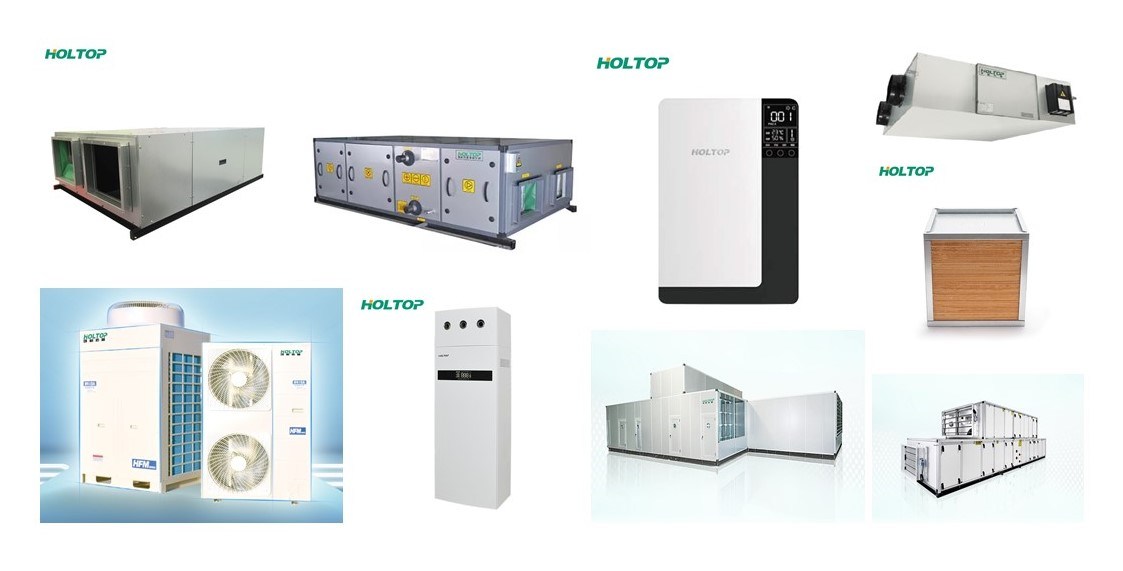During the last week of June this year, about 15,000 people in Japan were transported to medical facilities by ambulance due to heatstroke. Seven deaths occurred, and 516 patients were seriously ill. Most parts of Europe also experienced unusually high temperatures in June, reaching 40ºC in many regions. Due to global warming, heat waves have been hitting most areas of the world more frequently in recent years. Many people have been affected by the heat waves.
In Japan, about 5,000 people die each year from accidents while taking a bath at home. Most of these accidents occur in winter, with the main supposed cause being a heat shock response.
Heatstroke and heat shock response are typical cases in which the temperature of the environment can cause fatal damage to the human body.
Heatstroke and Heat Shock Response
Heatstroke is a general term for symptoms that occur when the human body cannot adapt to a hot and humid environment. The body temperature rises during exercise or working in a hot and humid environment. Usually, the body sweats and allows the heat to escape to the outside in order to lower its temperature. However, if the body sweats too much and loses water and salt internally, the heat entering and exiting the body will be unbalanced, and the body temperature will rise sharply, resulting in loss of consciousness and death in severe cases. Heatstroke can occur not only outdoors but also indoors, when the room temperature rises. About 40% of people who suffer from heatstroke in Japan develop it indoors.
Heat shock response means that the body is damaged by a sudden change in temperature. Conditions caused by heat shock often occur in winter. Blood pressure rises and falls, damaging blood vessels in the heart and brain, causing attacks such as myocardial infarction and stroke. If such conditions are not treated urgently, serious sequelae often remain, and death is not uncommon.
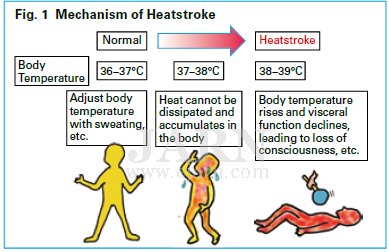
In Japan, deaths in bathrooms increase in winter. Living rooms and other rooms people spend time in are heated, but bathrooms are often unheated in Japan. When a person goes from a warm room to a cold bathroom and plunges into hot water, the person’s blood pressure and body temperature will rise and fall sharply, causing heart and brain attacks.
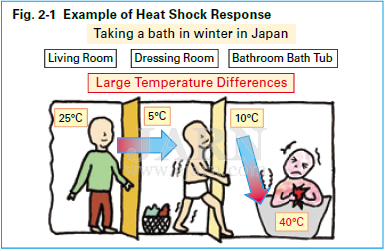
When exposed to broad temperature differences over a short period, for example, when going back and forth between cold outdoor and warm inside environments in winter, people may feel faint, feverish, or sick. During the development of air conditioners, it is common to conduct cooling tests in winter and heating tests in summer. The author experienced a heating test and felt faint after going back and forth between the test room at a temperature of –10ºC and the room at a temperature of 30ºC over a short period. This was a human endurance test.
Temperature Sense and Accustomedness
Humans have five senses: sight, hearing, smell, taste, and touch. In addition, they sense temperature, pain, and balance. The temperature sense is a part of the tactile sense, and heat and cold are felt by the receptors called warm spots and cold spots, respectively. Among mammals, humans are heat-resistant animals, and it is said that only humans can run marathons under the scorching sun of summer. This is because humans can lower their body temperature by sweating from the skin of the whole body.
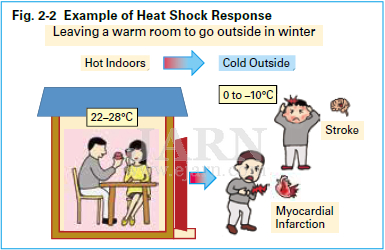
It is said that animate beings adapt to the continuously changing environment to sustain life and livelihood. ‘Adaptation’ translates to ‘accustomedness’. Studies have shown that when it gets hot suddenly in the summer, the risk of heatstroke increases, especially on the second and third days, then after a week, humans become accustomed to the heat. Humans also become accustomed to the cold. People who live in an area where the usual outside temperature can be as low as –10ºC will feel warm on a day when the outside temperature rises to 0ºC. Some of them may wear a T-shirt and become sweaty on a day when the temperature is 0ºC.
The temperature that human beings perceive is different from the actual temperature. In the Tokyo area of Japan, many people feel that it gets warmer in April and colder in November. However, according to meteorological data, the maximum, minimum, and average temperatures in April and November are about the same.
Air Conditioning and Temperature Control
Due to the effects of global warming, heat waves are hitting most parts of the world, and many accidents due to heatstroke have occurred this year too. However, it is said that the risk of heat-related death has decreased with the spread of air conditioning.
Air conditioners soften the heat and prevent heatstroke. As the most effective heatstroke prevention measure, it is recommended to use air conditioners indoors.
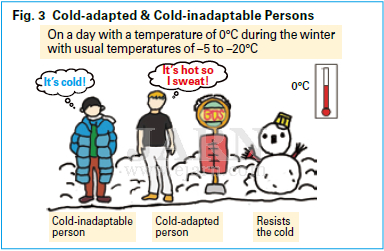
Air conditioners control the room temperature and humidity in order to create a comfortable situation, but the outside temperature condition does not change. When people go back and forth between places with large temperature differences, they suffer from greater stress and may get sick due to temperature changes and may damage their health.
The following measures can be considered to avoid large temperature changes over a short period of time with respect to human behavior.
– To prevent heat shock responses in winter, keep the temperature difference between rooms within 10ºC.
– To prevent heatstroke in summer, keep the temperature difference between the outdoor and indoor temperatures within 10ºC. It seems effective to change the room temperature setting by using air conditioning, according to the detected outdoor temperature and humidity.
– When going back and forth indoors and outdoors, create an intermediate temperature condition or space and stay there for a while to get used to the environment, and then go in or out.
Research on air conditioning, housing, equipment, human behavior, etc. is necessary in order to reduce the damage to health caused by temperature changes. It is hoped that air conditioning products that embody these research results will be developed in the future.
Holtop is the leading manufacturer in China specializing in the production of air to air heat recovery equipments. It is dedicated to the research and technology development in the field of heat recovery ventilation and energy saving air handling equipments since 2002. The main products includes energy recovery ventilator ERV/HRV, air heat exchanger, air handling unit AHU, air purification system. Besides, Holtop professional project solution team can also offer customized hvac solutions for different industry.
Post time: Oct-13-2022

